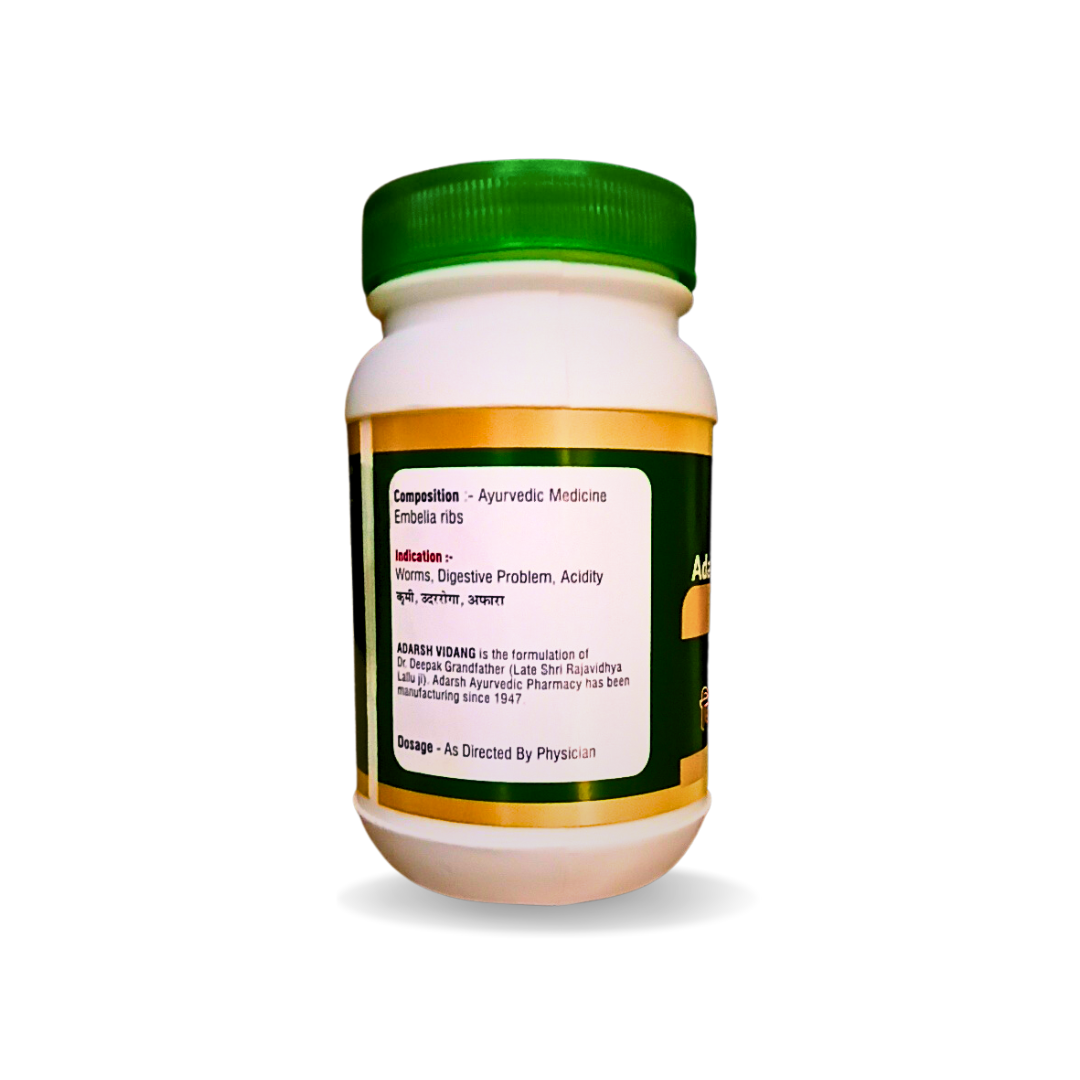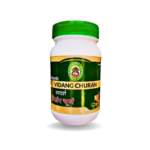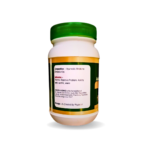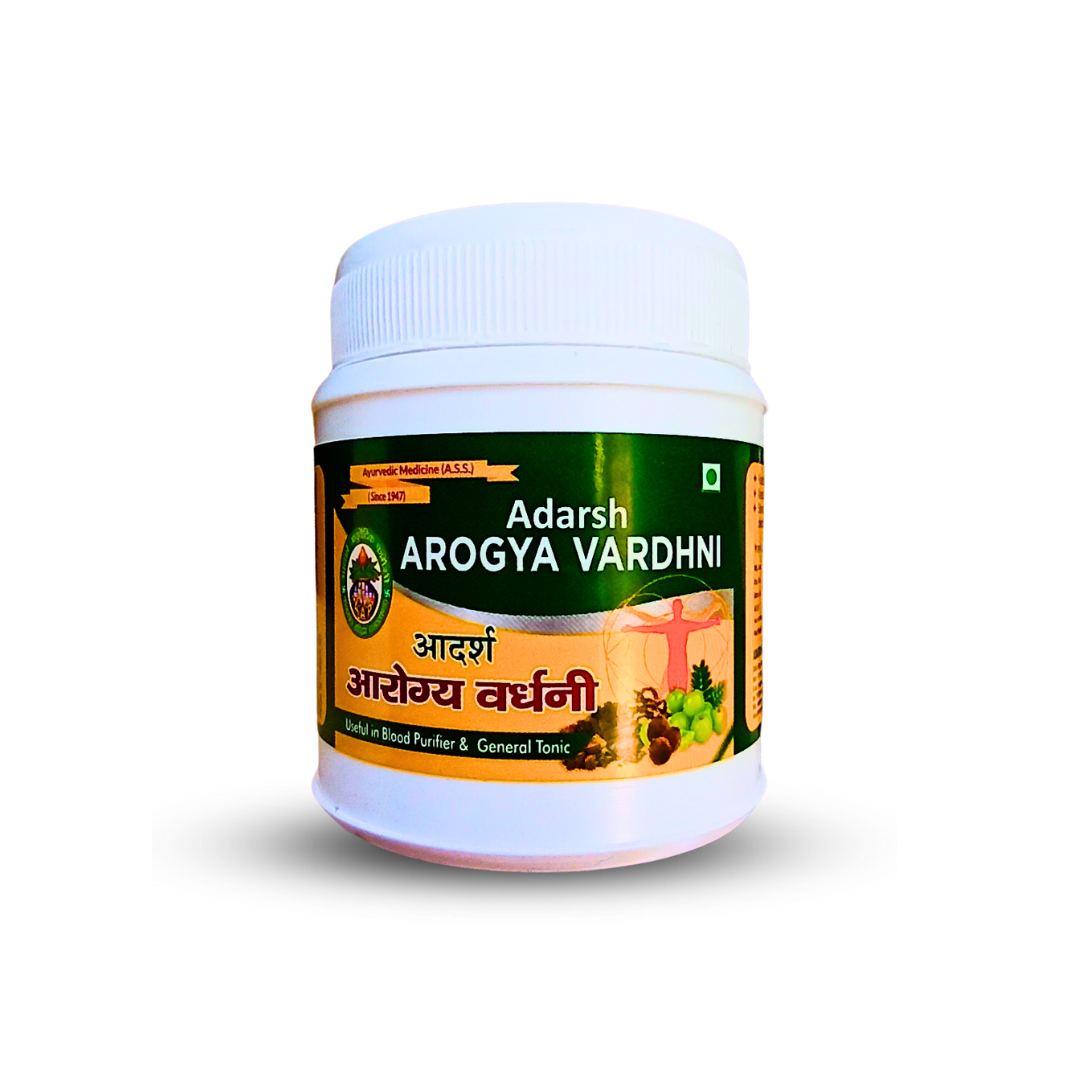Vidang Churan
₹200
Vidang, also known as Embelia ribes, is a well-known herb in Ayurvedic medicine that is used to treat a variety of health conditions, including digestive problems and worm infestations.
In Ayurveda, vidang is commonly used to treat intestinal worms such as tapeworms and roundworms. It is believed to have anthelmintic properties that help to expel these parasites from the body. Vidang is also used to improve digestion and alleviate digestive problems such as constipation, bloating, and gas.
- Delivery & Return
Delivery
We ship to all over the world. All orders are shipped with a UPS tracking number. Always free shipping for orders over 1000. During sale periods and promotions the delivery time may be longer than normal.Return
Adarsh Ayurvedic Pharmacy will accept exchanges and returns of undamaged box within 30 days of the date of purchase (14 days during the sales period), on presentation of the original till receipt at any store where the corresponding collection is available within the country of purchase. Your return will usually be processed within a week to a week and a half. We’ll send you a Return Notification email to notify you once the return has been completed. Please allow 1-3 business days for refunds to be received to the original form of payment once the return has been processed.Help
Give us a shout if you have any other questions and/or concerns. Email: aapdeepak.hdr@gmail.com Phone: 9897902760
Vidang, also known as Embelia ribes, is a well-known herb in Ayurvedic medicine that is used to treat a variety of health conditions, including digestive problems and worm infestations.
In Ayurveda, vidang is commonly used to treat intestinal worms such as tapeworms and roundworms. It is believed to have anthelmintic properties that help to expel these parasites from the body. Vidang is also used to improve digestion and alleviate digestive problems such as constipation, bloating, and gas.
In addition, vidang is believed to have anti-inflammatory and antioxidant properties that can help alleviate acidity and promote overall digestive health. It is often used in combination with other herbs to create Ayurvedic formulations for various health conditions.
However, it’s important to note that Ayurvedic medicines should only be taken under the guidance of a qualified Ayurvedic practitioner or healthcare professional, as they can have potential side effects and interactions with other medications. Additionally, it’s important to seek medical attention if symptoms persist or worsen.
In Ayurveda, vidang is commonly used to treat intestinal worms such as tapeworms and roundworms. It is believed to have anthelmintic properties that help to expel these parasites from the body. Vidang is also used to improve digestion and alleviate digestive problems such as constipation, bloating, and gas.
Buy 10 get one free.
Selflife: 3 Years
| Weight | 250 g |
|---|---|
| Dimensions | 14 × 12.5 × 8.5 cm |
| Weight | 100gm |
Based on 0 reviews
|
|
|
0% |
|
|
|
0% |
|
|
|
0% |
|
|
|
0% |
|
|
|
0% |
Only logged in customers who have purchased this product may leave a review.
Related Products
Ashwagandha Ghan is typically taken orally in liquid form, and the dosage and duration of treatment may vary depending on the individual’s needs and the practitioner’s recommendations. It is important to consult with a qualified Ayurvedic practitioner before using Ashwagandha Ghan, especially if you have a history of medical conditions or are currently taking any medications. Additionally, it is important to be aware of potential side effects and contraindications before using any herbal supplement.
The primary active compounds in Ashwagandha Ghan include withanolides, alkaloids, and flavonoids, which are believed to have adaptogenic, anti-inflammatory, and antioxidant properties. Ashwagandha Ghan is commonly used in Ayurvedic medicine for reducing stress and anxiety, supporting healthy immune function, and promoting overall vitality and wellness.
Jatyadi tail is typically applied topically to the affected area and gently massaged into the skin. The frequency and duration of use can vary based on individual needs and the guidance of a qualified healthcare professional. It is important to note that like all herbal remedies, Jatyadi tail may cause allergic reactions or other side effects in some individuals, and should be used with caution.
Jatyadi tail is an Ayurvedic herbal oil that is made from a blend of several herbs, including Jatiphal (Myristica fragrans), Haridra (Turmeric), and Neem (Azadirachta indica). This oil is commonly used in Ayurvedic medicine for the treatment of various skin disorders, such as cuts, wounds, burns, and other skin irritations.
Eladi Vati is typically taken orally, and the recommended dosage and duration of use may vary depending on the individual’s condition and overall health. It is important to consult with a qualified Ayurvedic practitioner before using this or any other herbal remedy.
Although Eladi Vati is generally considered safe when taken as directed, some individuals may experience side effects such as stomach upset, allergic reactions, or interactions with other medications. It is important to speak with a healthcare provider before using this or any other herbal remedy, especially if you are pregnant, breastfeeding, or have any underlying health conditions.
Out of stock
Varunadi Kwath is typically prepared by boiling the herbal mixture in water and then straining the decoction before consuming. It is important to note that like all herbal remedies, Varunadi Kwath should be taken under the guidance of a qualified healthcare professional, as it may interact with certain medications or have potential side effects in some individuals.
Varunadi Kwath is an Ayurvedic herbal decoction made from a blend of several herbs, including Varuna (Crataeva nurvala), Gokshura (Tribulus terrestris), and Punarnava (Boerhavia diffusa).
Dashmool Ghan is typically taken orally and the dosage and duration of treatment may vary depending on the individual’s needs and the practitioner’s recommendations. It is important to consult with a qualified Ayurvedic practitioner before using Dashmool Ghan, especially if you have a history of medical conditions or are currently taking any medications.
Additionally, it is important to be aware of potential side effects and contraindications before using any herbal supplement. Dashmool Ghan is believed to have several health benefits, particularly for the respiratory and nervous systems. The primary active compounds in Dashmool Ghan include alkaloids, flavonoids, and triterpenoids, which are believed to have anti-inflammatory, analgesic, and antioxidant properties. Dashmool Ghan is commonly used in Ayurvedic medicine for reducing inflammation, pain, and anxiety, and promoting overall health and wellness.
Prawal Panchamrit is believed to have antacid and digestive properties, which can help in the treatment of acidity, heartburn, indigestion, and gastritis. It is also believed to improve appetite, promote digestion, and reduce inflammation in the stomach lining.
However, it is essential to note that the use of Prawal Panchamrit should be done under the guidance of a qualified Ayurvedic practitioner. Overdose or incorrect usage can cause adverse effects like constipation, stomach upset, and nausea. It is also not recommended for pregnant and lactating women and people with liver or kidney problems.
Haritaki is another important herb in Ayurveda and is considered to be one of the most versatile herbs in the Ayurvedic pharmacopoeia. It is believed to have a wide range of health benefits, including promoting digestion, supporting healthy liver function, and improving cognitive function.
Together, Chitrak and Haritaki are believed to enhance each other’s effects, making Chitrak Haritaki a powerful herbal remedy for digestive disorders and other health conditions.
Chitrak Haritaki is commonly used in Ayurvedic medicine to treat a variety of health conditions, including poor digestion, constipation, abdominal pain, flatulence, anemia, and respiratory disorders. It is typically taken in powdered form, mixed with warm water or milk, or Chitrak Haritaki is an Ayurvedic herbal formulation made from two main ingredients: Chitrak (Plumbago zeylanica) and Haritaki (Terminalia chebula).
Rasanasaptak Kwath is an Ayurvedic herbal decoction made from a combination of seven herbs, including Ashwagandha (Withania somnifera), Shatavari (Asparagus racemosus), and Guduchi (Tinospora cordifolia).
According to Ayurvedic principles, Rasanasaptak Kwath is believed to help support overall health and well-being by promoting healthy digestion, improving immunity, and reducing inflammation in the body. It is commonly used to help manage symptoms associated with arthritis, joint pain, and other inflammatory conditions.
Rasanasaptak Kwath is typically prepared by boiling the herbal mixture in water and then straining the decoction before consuming. It is important to note that like all herbal remedies, Rasanasaptak Kwath should be taken under the guidance of a qualified healthcare professional, as it may interact with certain medications or have potential side effects in some individuals.
Basant Kusumakar Ras is believed to work by regulating blood sugar levels, improving digestion, and strengthening the immune system. It is also used to treat urinary tract infections, liver disorders, and pancreatitis. However, it is important to note that Basant Kusumakar Ras should only be taken under the guidance of a qualified Ayurvedic practitioner, as it may have some side effects and interactions with other medications.
It is a herbo-mineral formulation that contains various natural ingredients, including Swarna Bhasma (gold ash), Rajat Bhasma (silver ash), Vanga Bhasma (tin ash), and other herbs such as Haritaki (Terminalia chebula), Bibhitaki (Terminalia bellirica), Amalaki (Emblica officinalis), Shuddha Shilajit (purified asphaltum), and Guggulu (Commiphora mukul).
According to Ayurveda, Khadiradi Vati is used to balance the Kapha and Pitta doshas in the body. It is commonly used for the treatment of dental problems such as toothache, gingivitis, and bad breath. It is also used to improve digestion and treat stomach disorders.
Khadiradi Vati is known for its anti-inflammatory and antibacterial properties. It helps in reducing inflammation and pain in the gums, and also helps in killing harmful bacteria in the mouth. It is also beneficial for treating skin disorders like acne and eczema.
Pathyadi Kwath is an Ayurvedic herbal decoction made from a blend of several herbs, including Haritaki (Terminalia chebula), Bibhitaki (Terminalia bellirica), and Shunti (Zingiber officinale).
According to Ayurvedic principles, Pathyadi Kwath is believed to help support respiratory health, particularly in cases of cough and cold. It is also commonly used to support digestive health, promote healthy metabolism, and alleviate symptoms associated with inflammation.
“Arogyavardhini” is an Ayurvedic herbal formulation that is traditionally used to promote overall health and well-being. It is believed to help support liver function, improve digestion, and boost the immune system.
The ingredients of Arogyavardhini of this specific formulation typically includes a combination of herbs and minerals such as triphala (a blend of three fruits), kutki (a bitter herb), guggulu (a resin), shilajit (a mineral pitch), Abarak bhasam , Loh Bhasam and others.
The unique formulation of Adarsh Aroghyavardhni has potency to burn fat and purify blood .
As with any herbal supplement, it is important to consult with a healthcare professional before taking Arogyavardhini, especially if you have any pre-existing medical conditions or are taking any medications.
Key Component:
1. Triphala: A blend of three fruits – amla, haritaki, and bibhitaki – that are known for their antioxidant and anti-inflammatory properties. Triphala is commonly used in Ayurveda to support digestion and overall health.
2. Kutki: A bitter herb that is commonly used in Ayurveda to support liver health and improve digestion. Kutki is believed to have anti-inflammatory, antiviral, and antioxidant properties.































Reviews
There are no reviews yet.